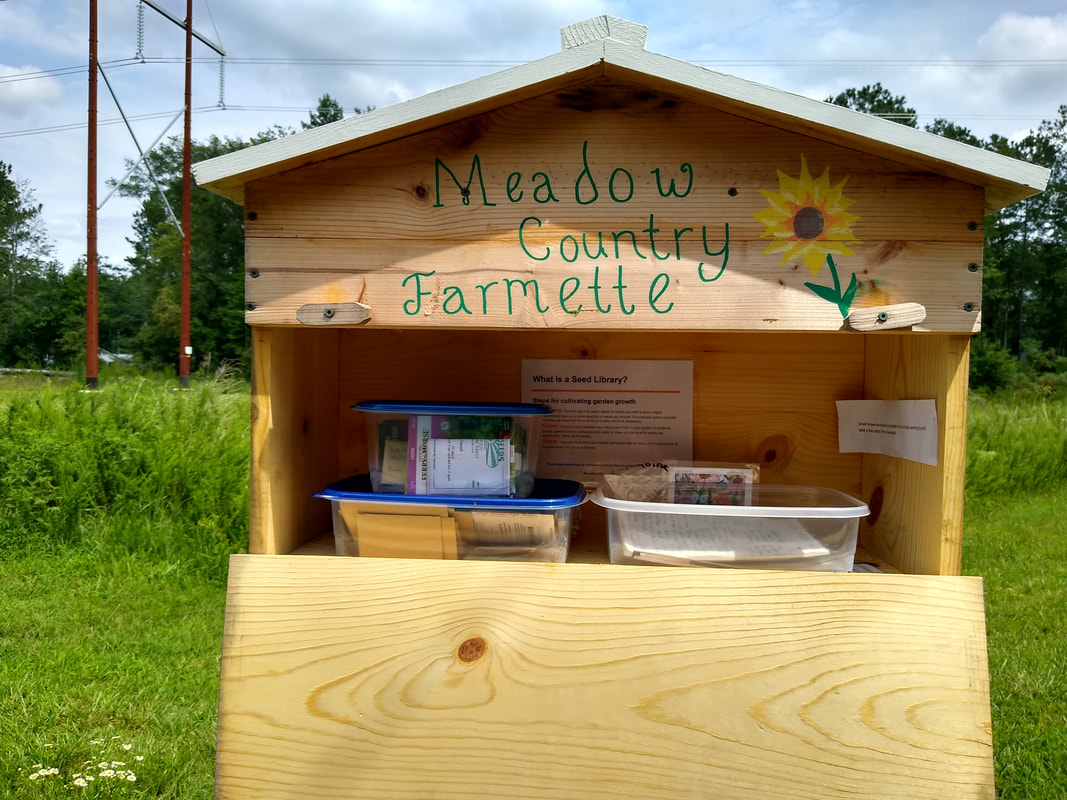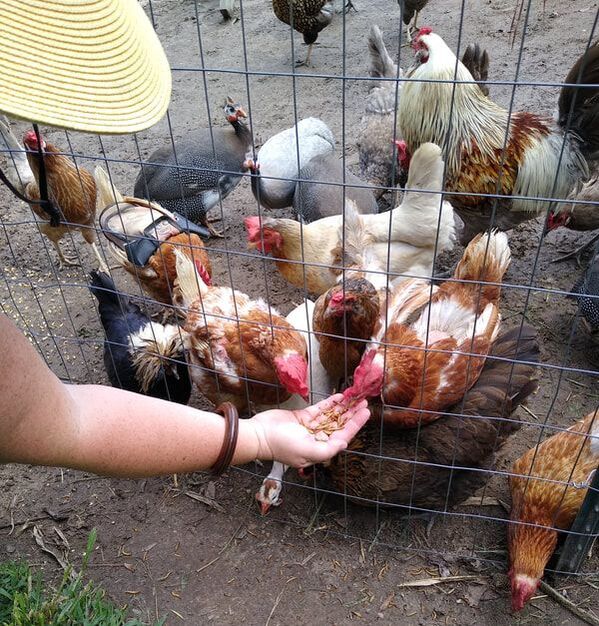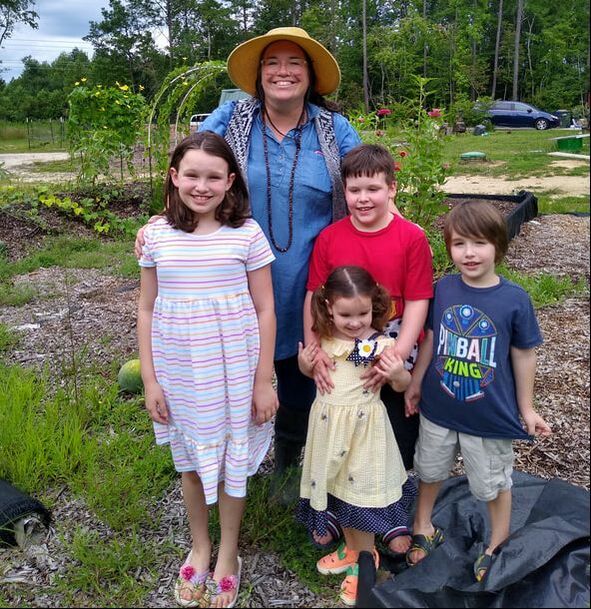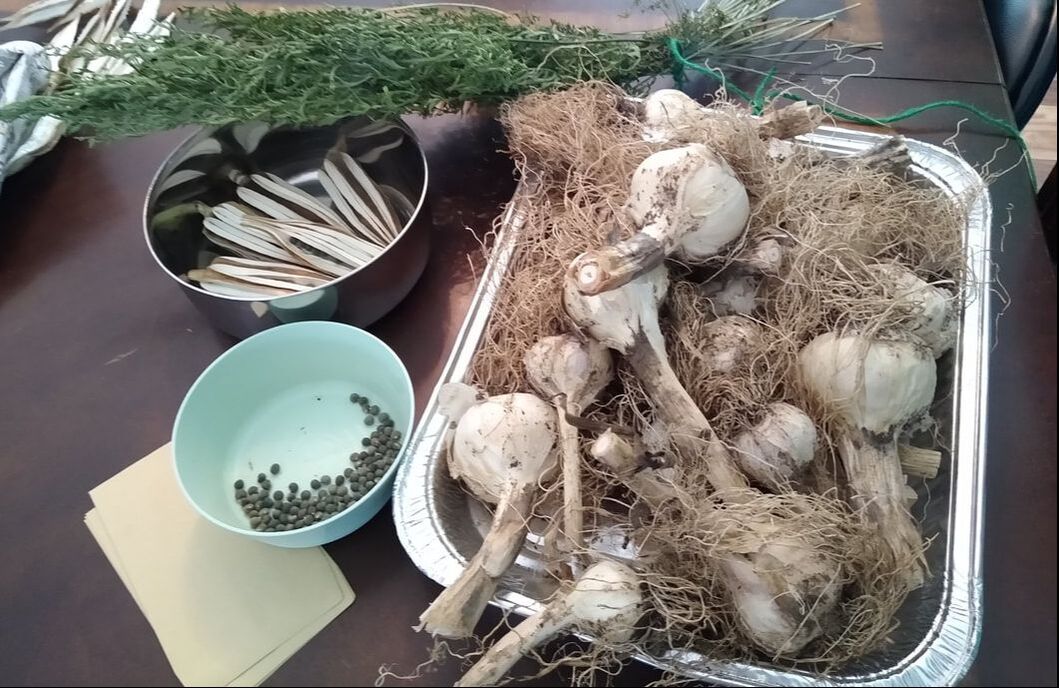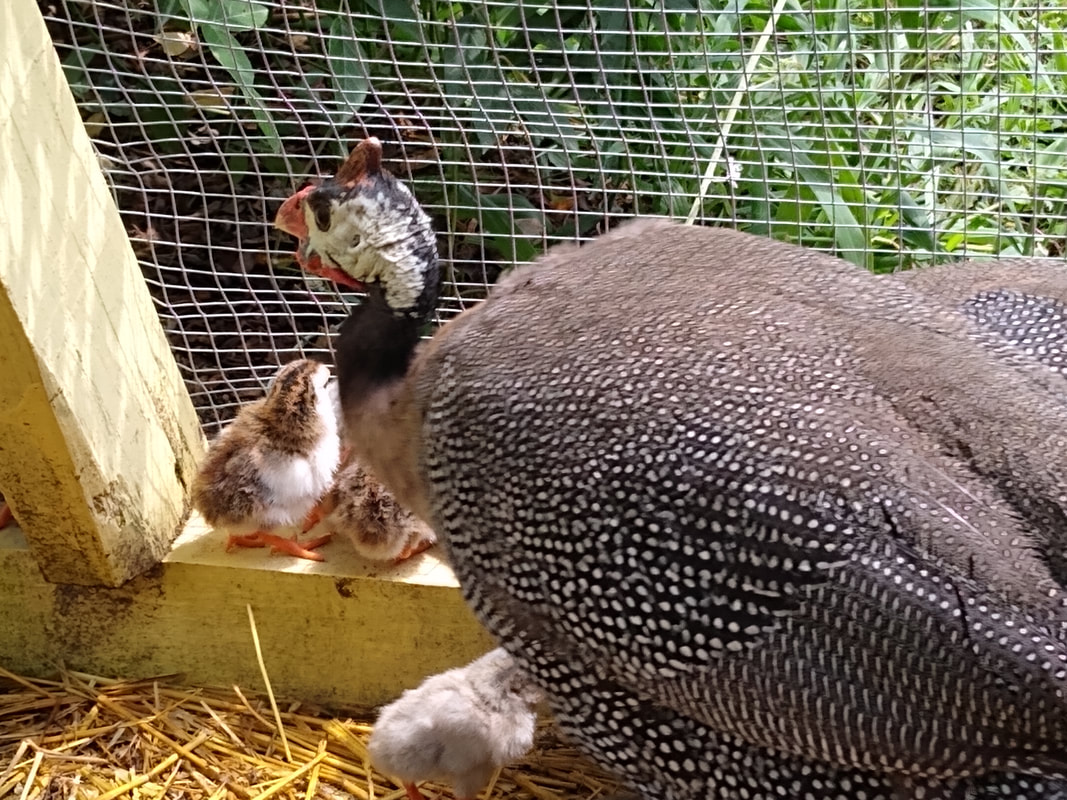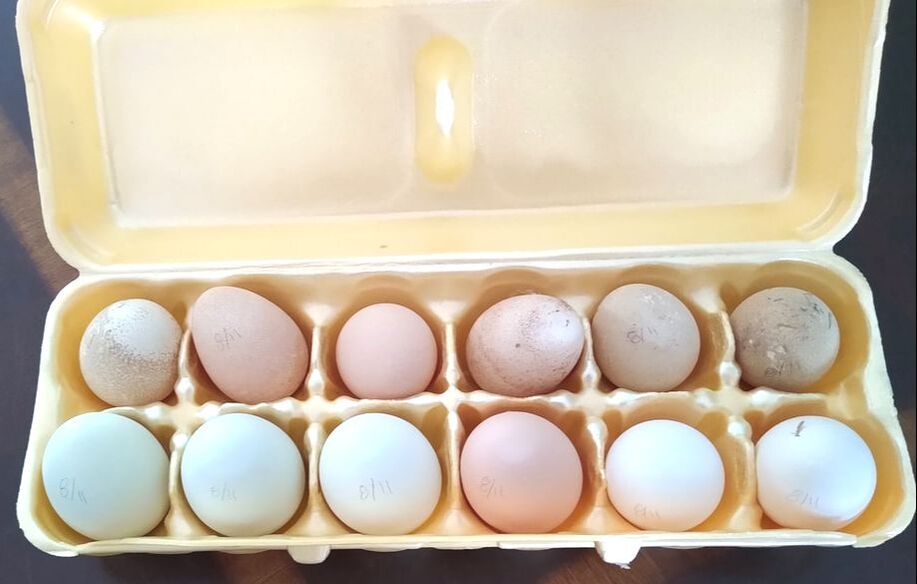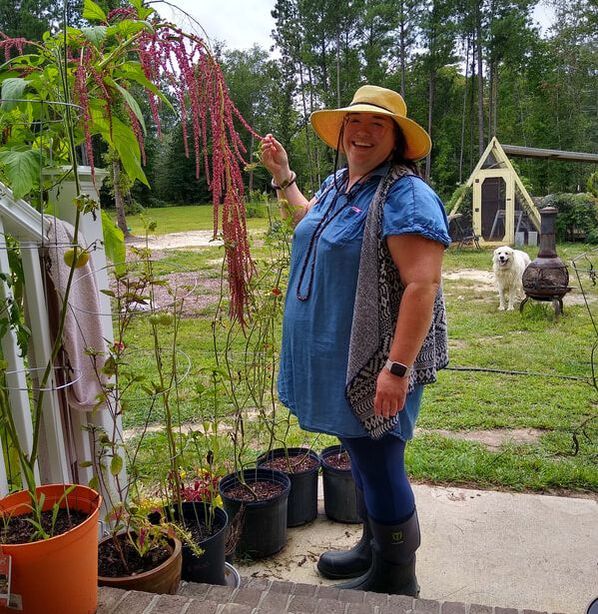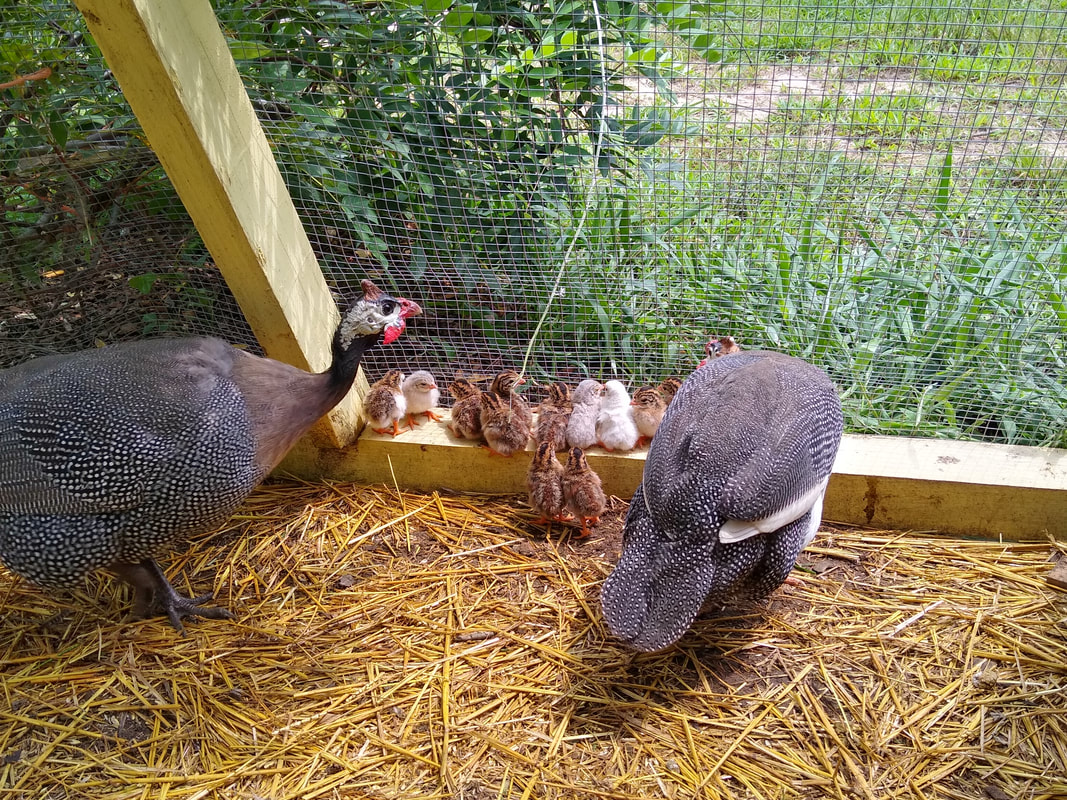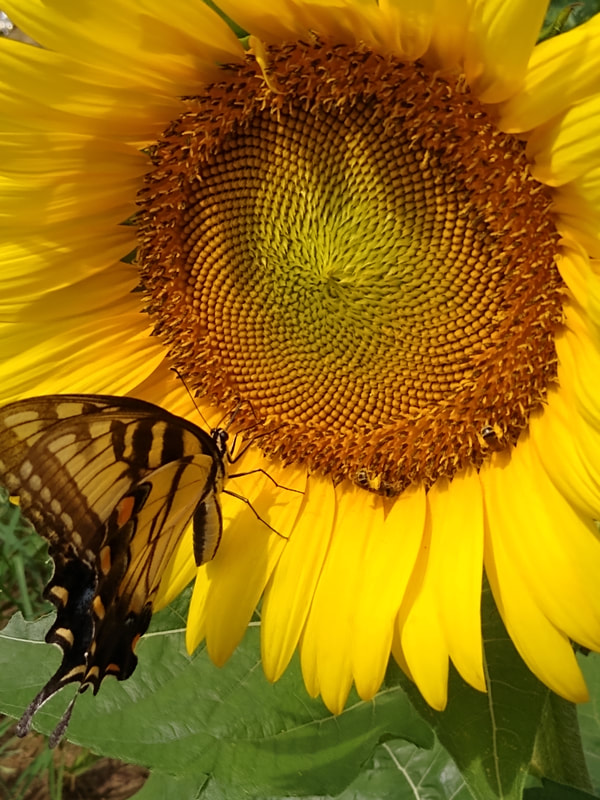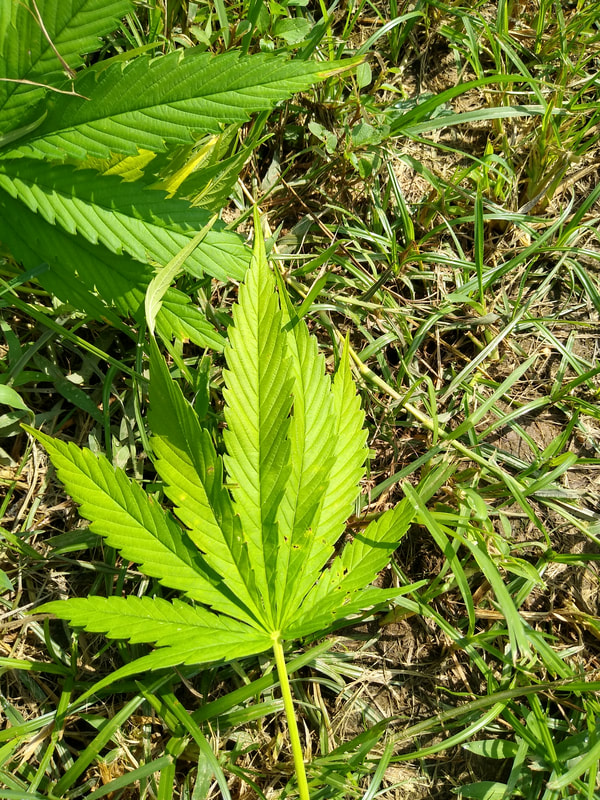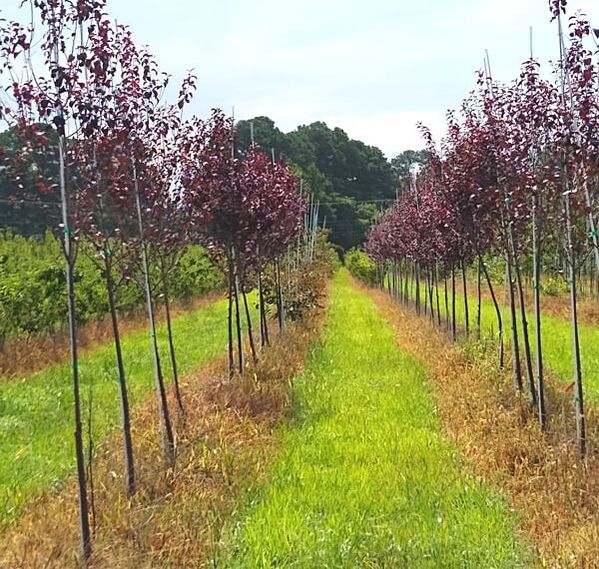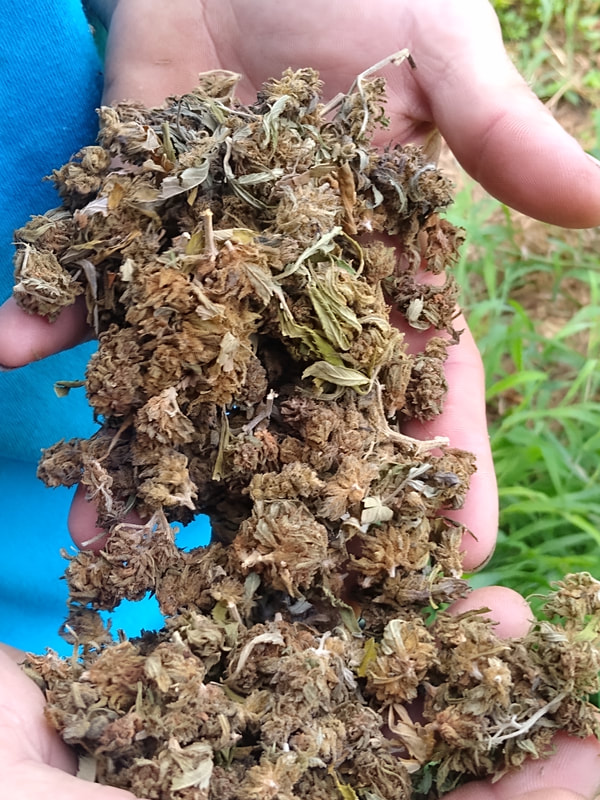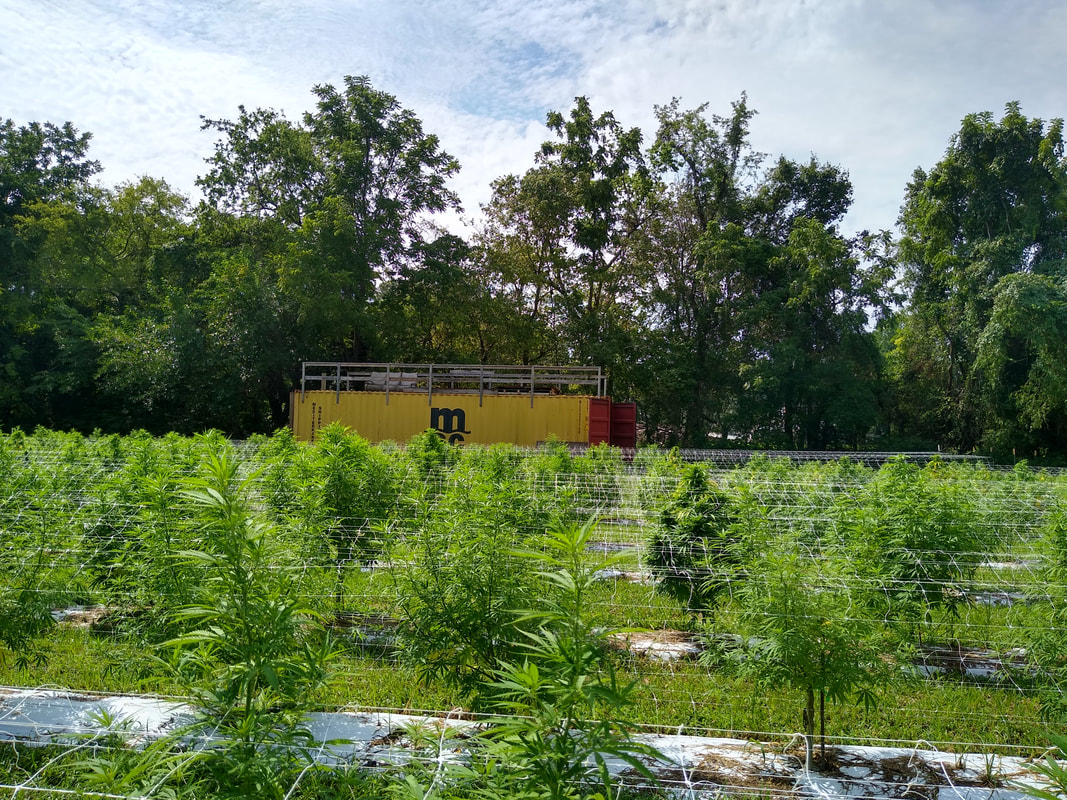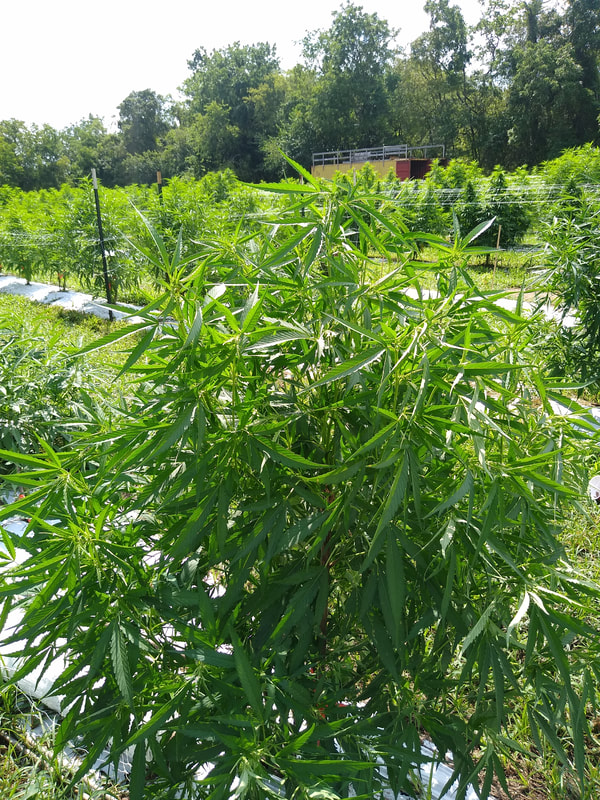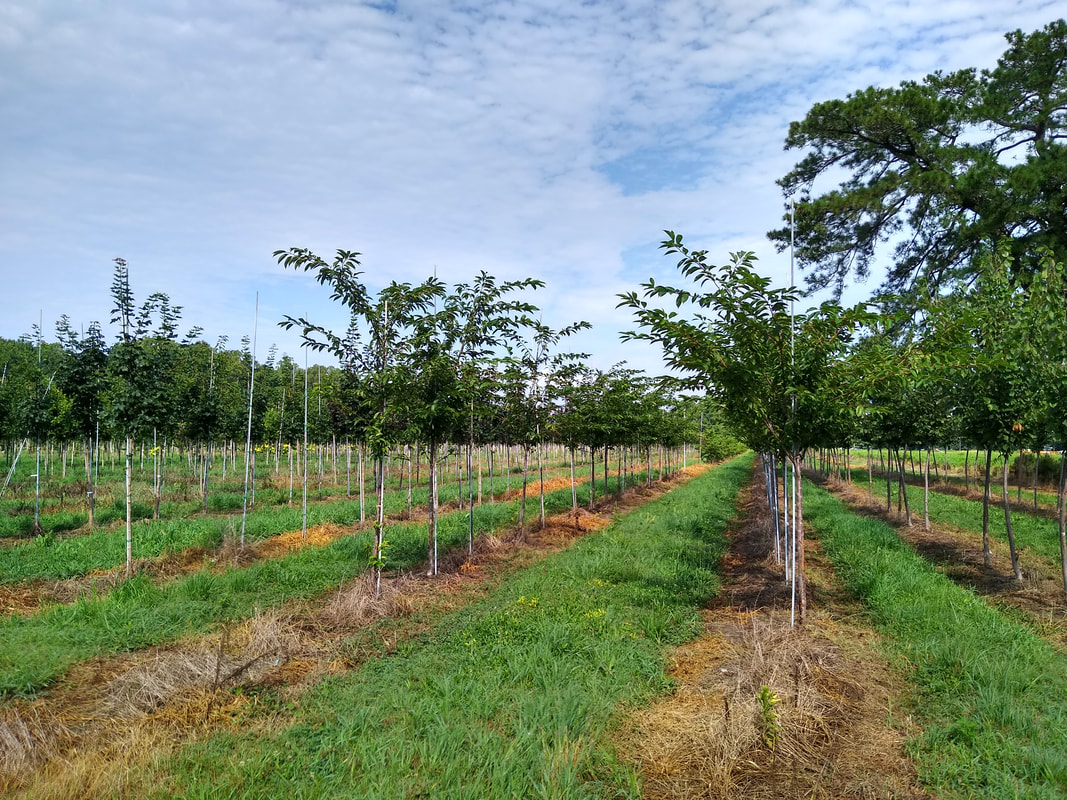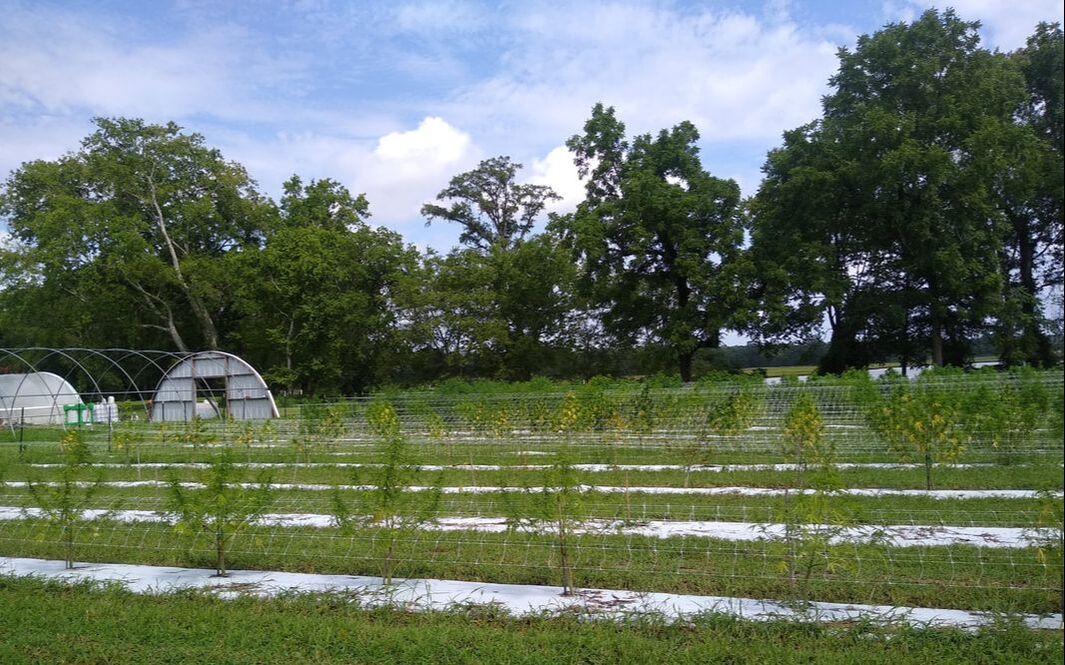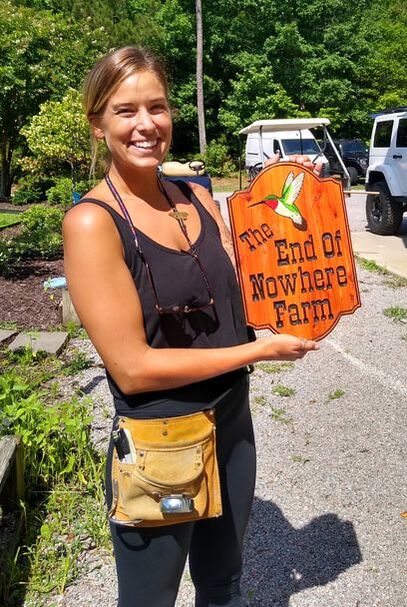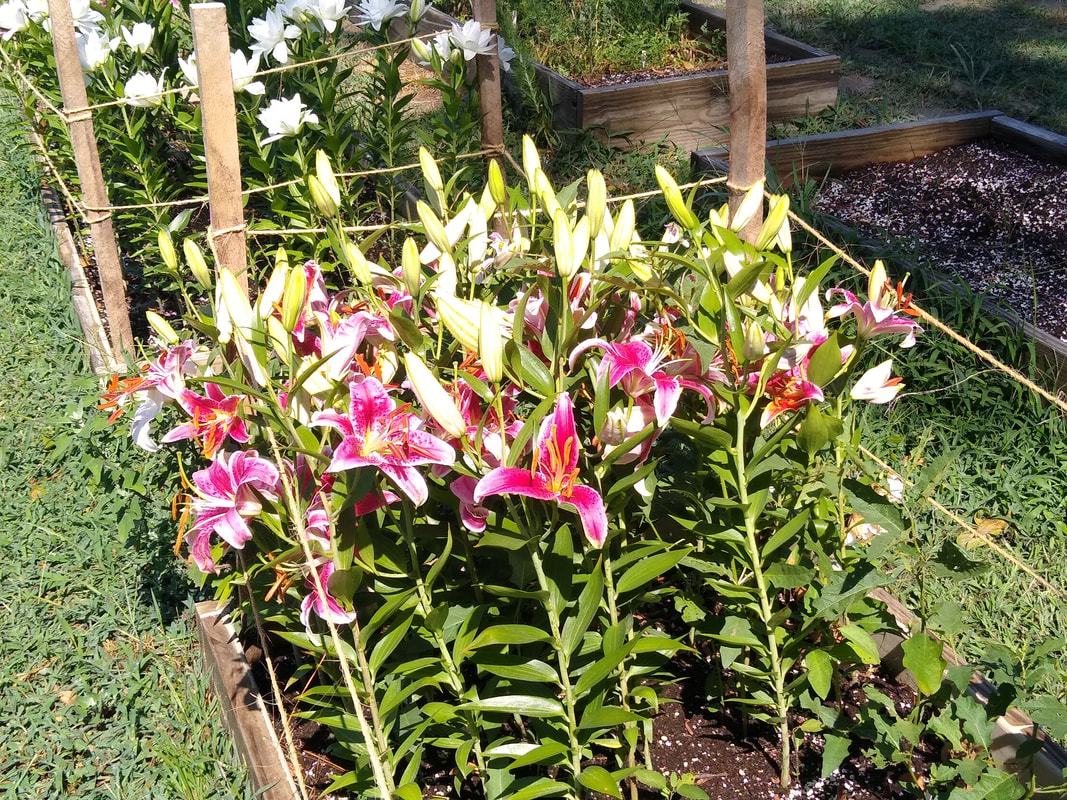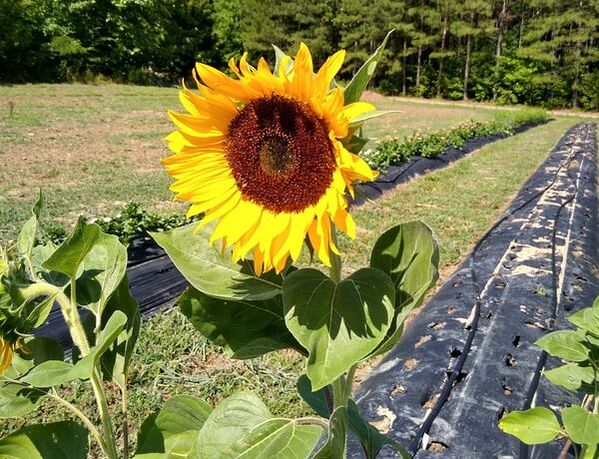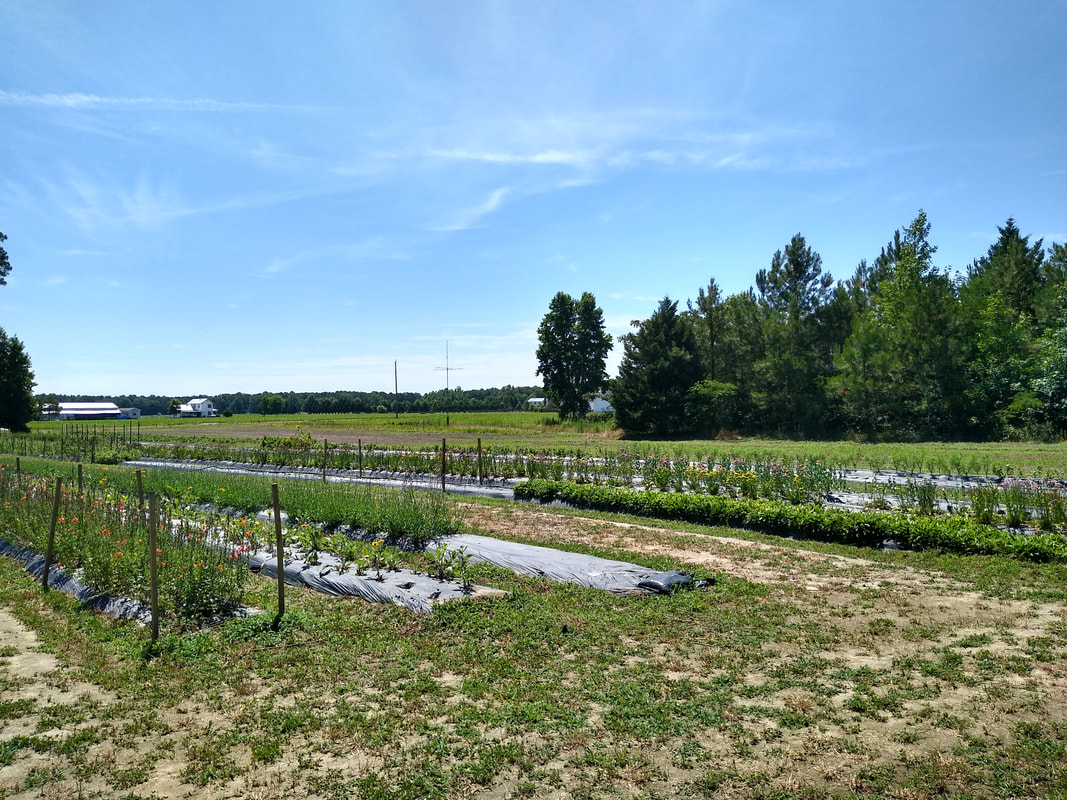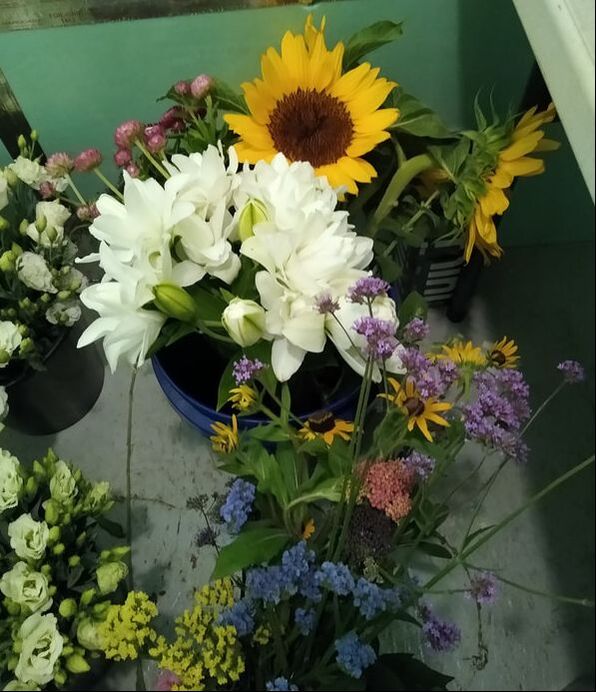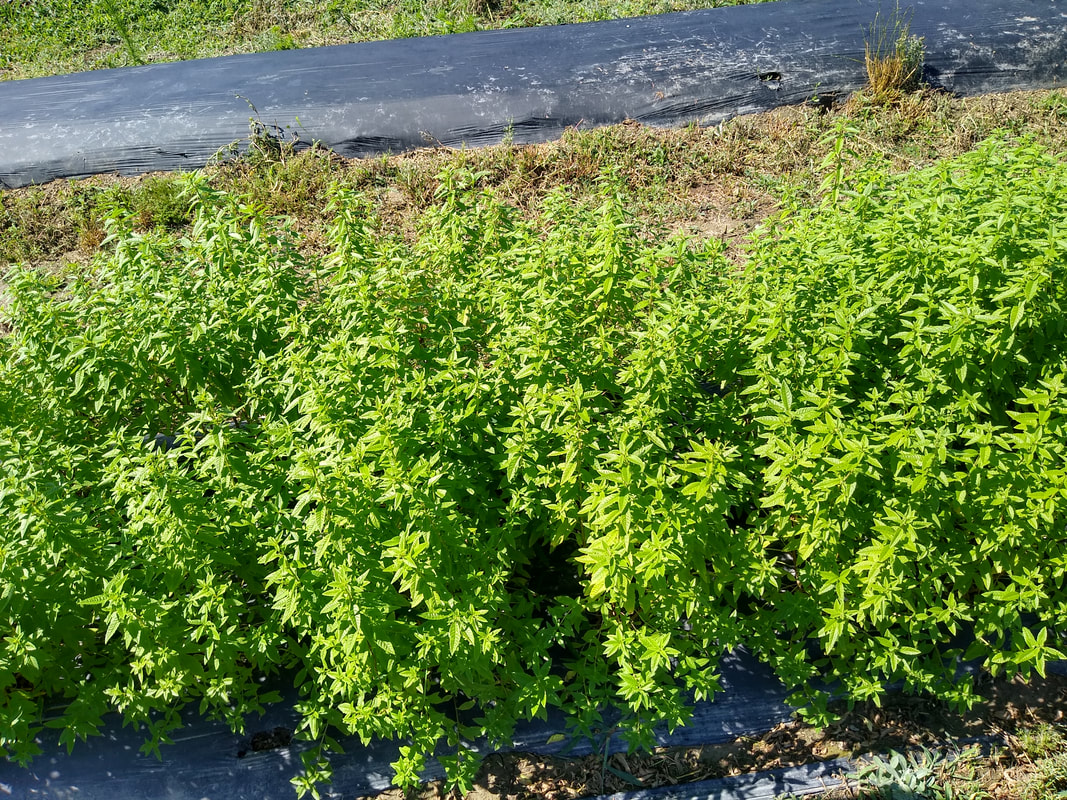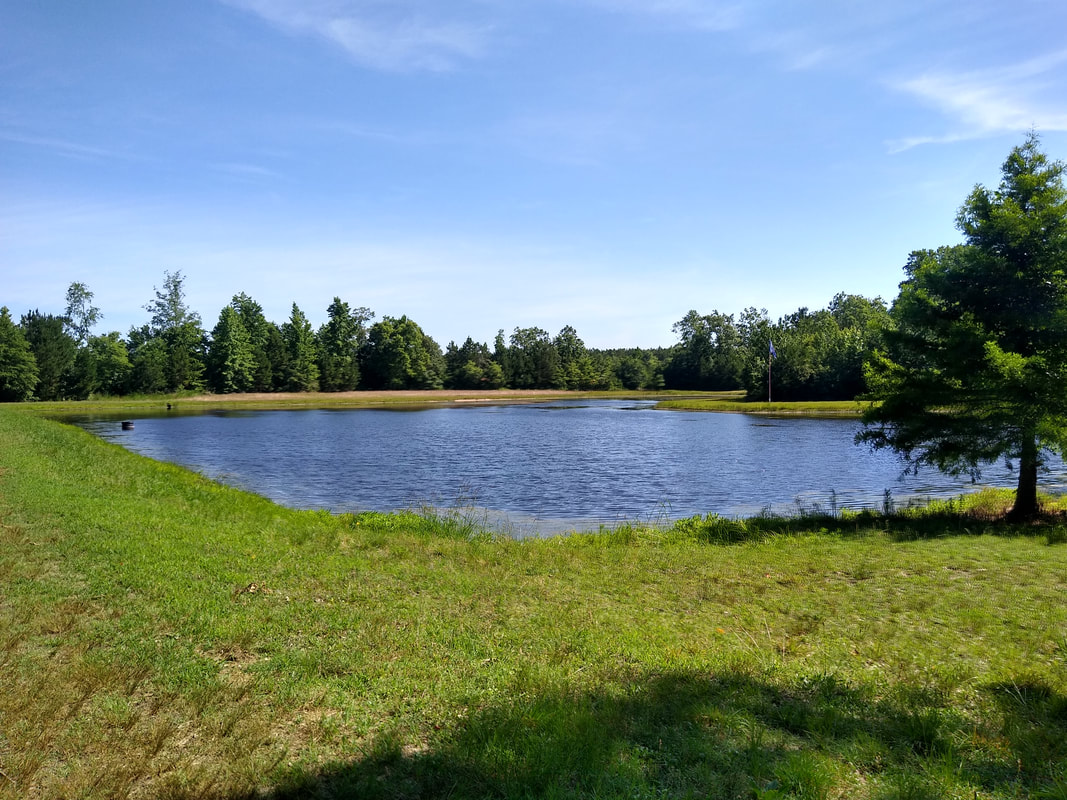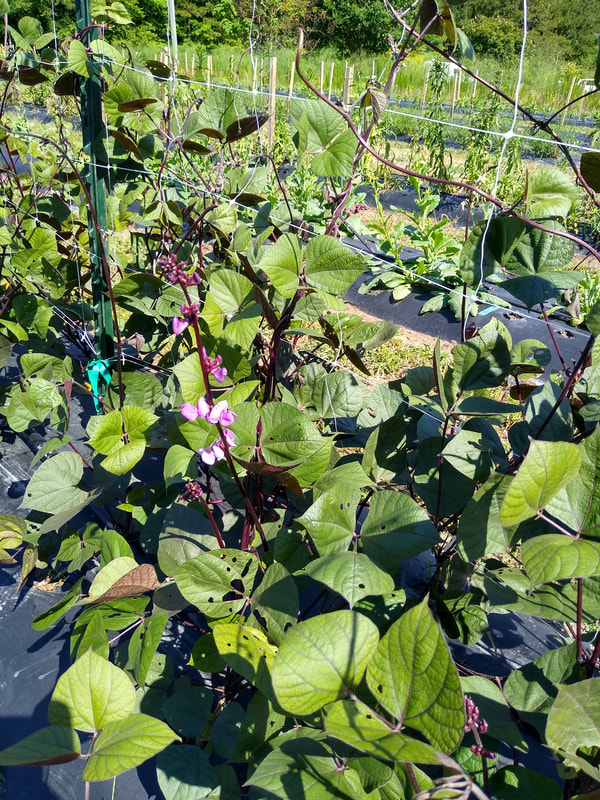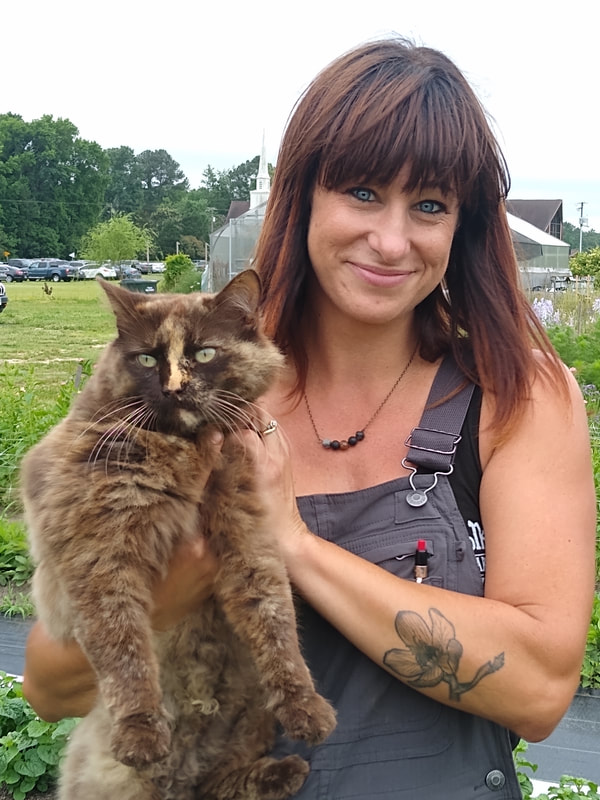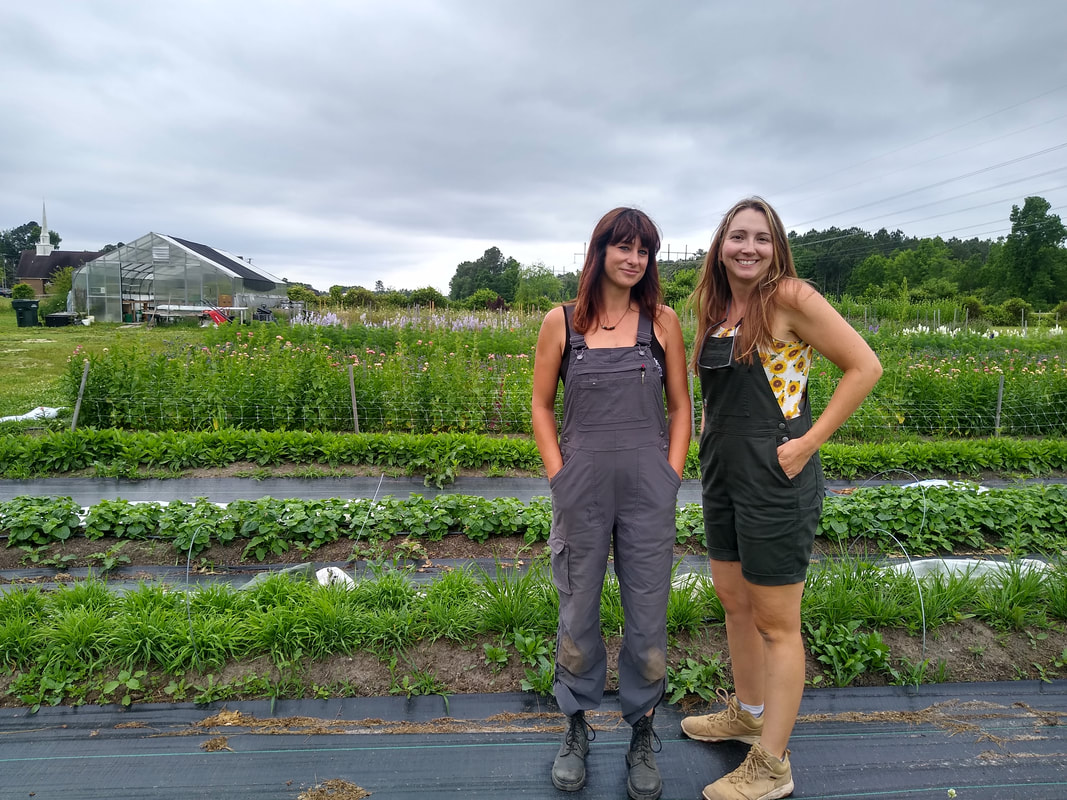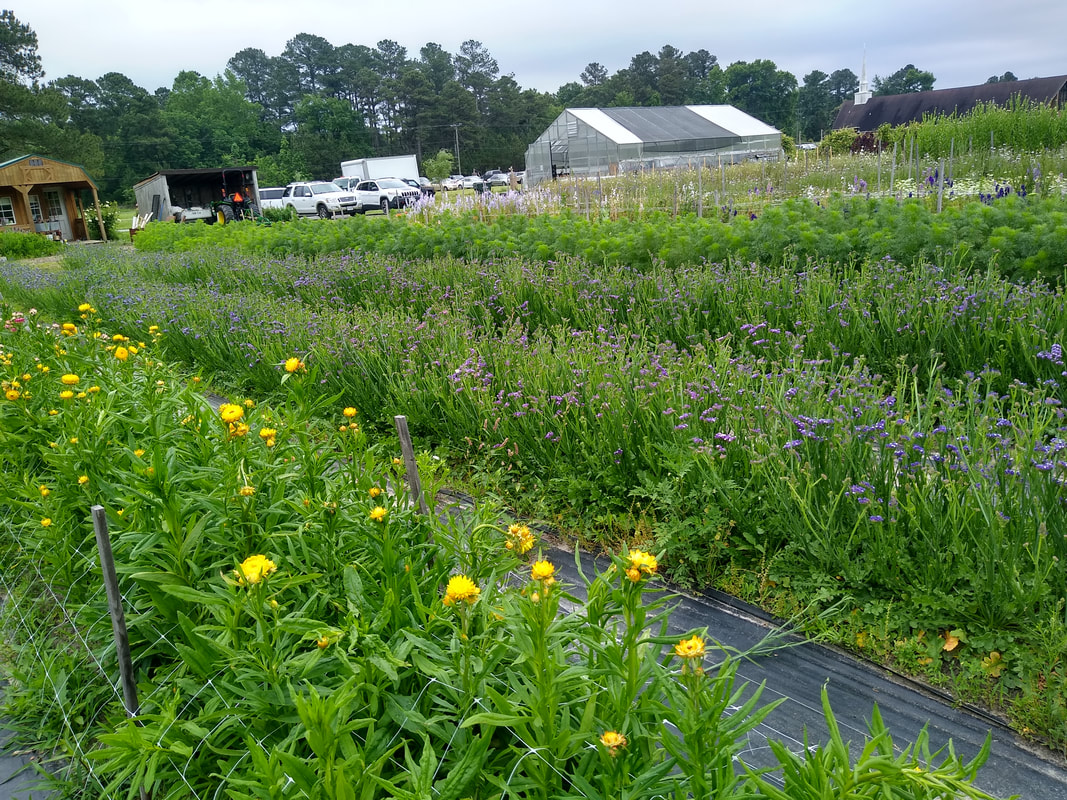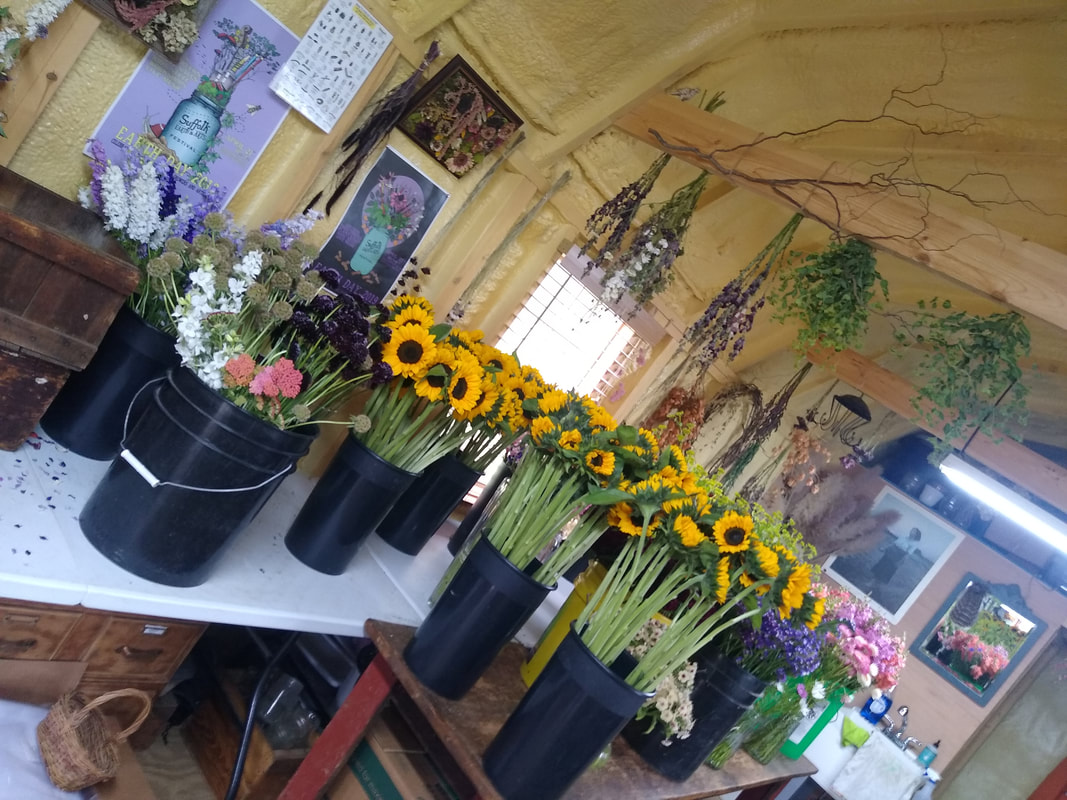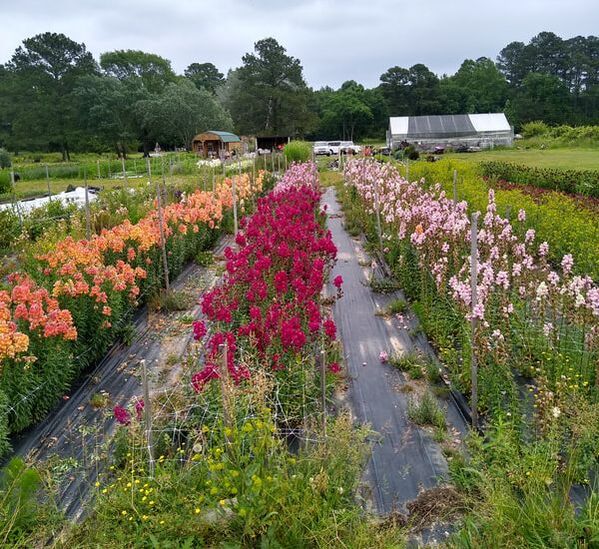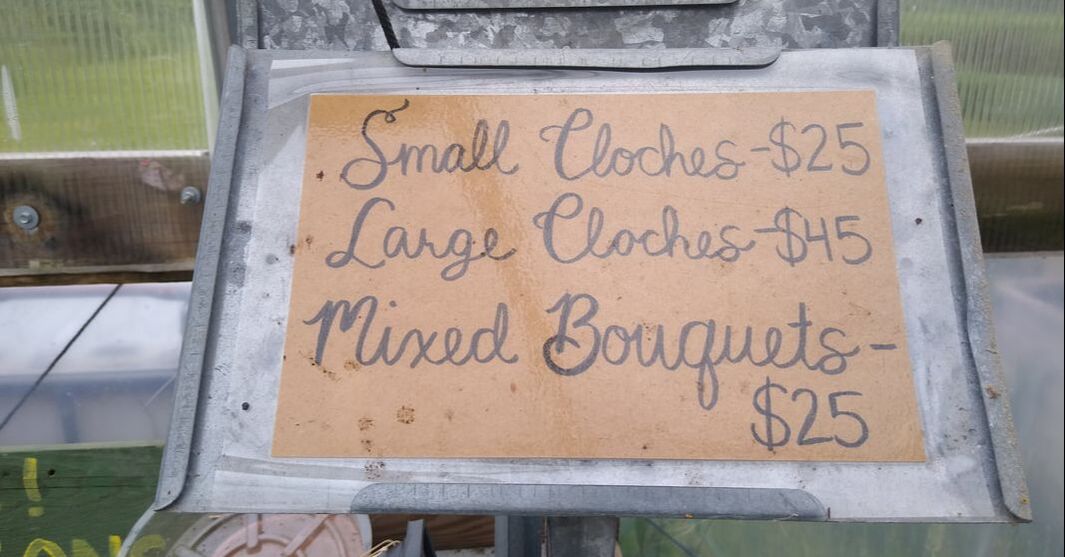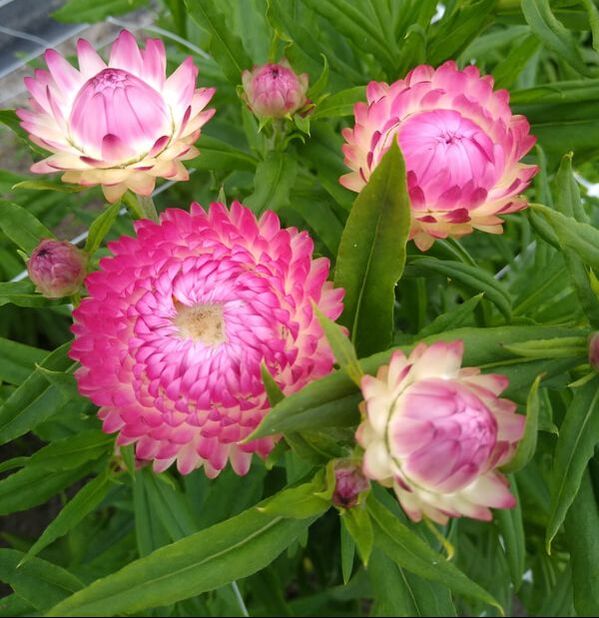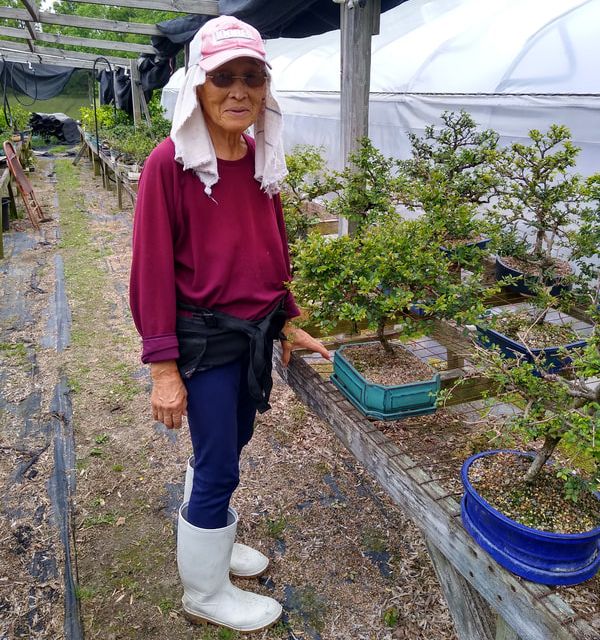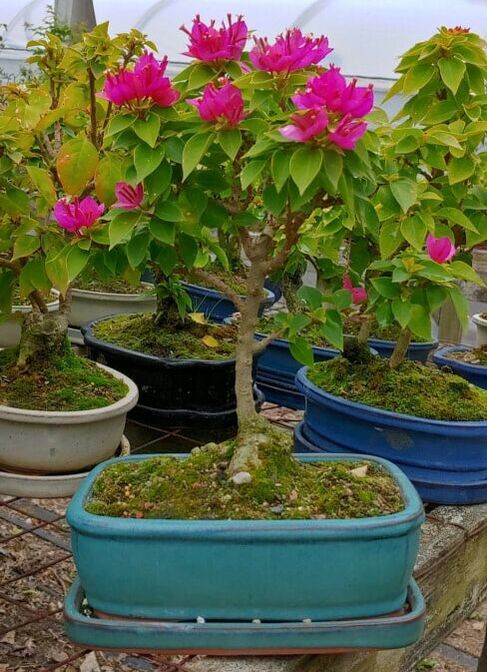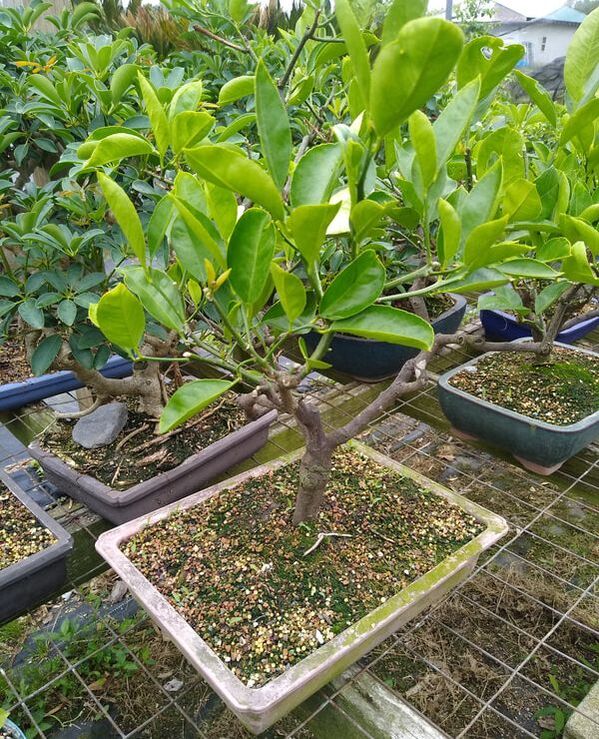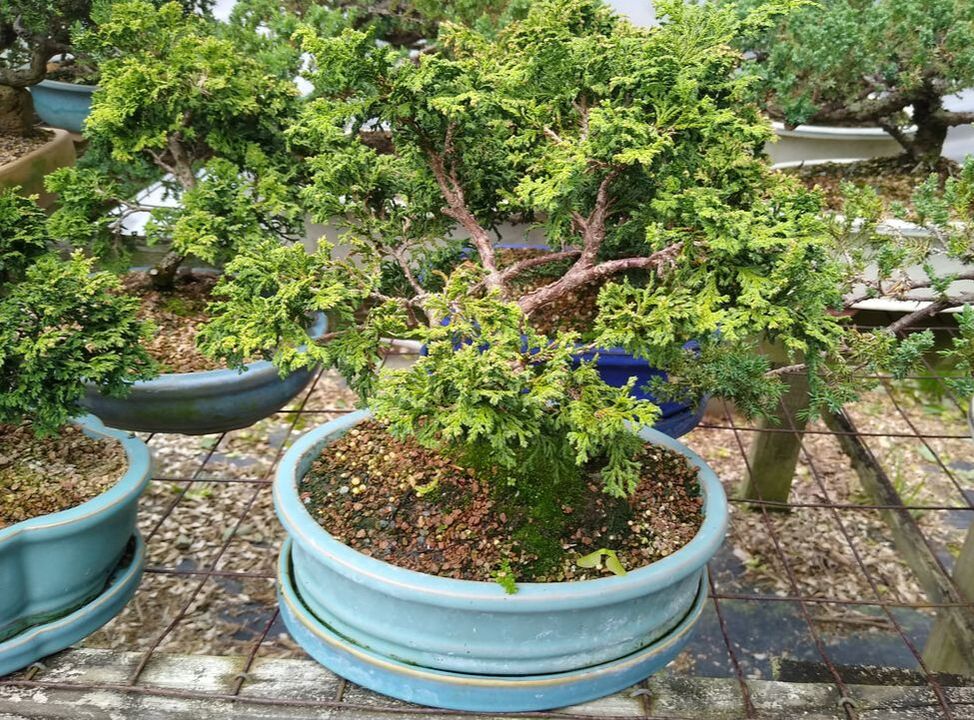Meet Meadow Country Farmette
2025 Meadow Country Road | Suffolk, Virginia 23434
Initially featured in an article by the Suffolk News Herald (https://www.suffolknewsherald.com/2022/04/19/dig-in-to-suffolks-first-seed-library/), this farmette operates under the principles of community health and activism. Beyond the seed library, they raise vegetables, trees, poultry, and honeybees. They are still growing so follow them on Facebook to see their journey!
|
Tell me a fun fact about yourself or your business.
These guinea fowl chicks were born two days ago on my birthday. It was a very special birthday gift! How long have you been in business? We’re still a young farmette and still growing! This is our fourth year farming. We’ve had our first honey harvest and first (successful) corn crop this year. We started from nothing so our first few years were devoted to figuring out what we needed to do to get healthy soil. The construction to clear the woods for our property scraped away all the top soil and left us with only sandy loam soil. Describe an average day for you. The animals are the first priority. At the height of the season, the guinea fowls and chickens lay 15-20 eggs a day. The kids and I take care of the plants and do other things after that. Our honeybees are self-sufficient. We recently had our first honey harvest from our topbar hives. My kids had such a great time with their mashers, crushing the honeycomb to get the honey. What is a hügelkultur*? How did you discover this technique? Can the average person have this in their yard? A hügelkultur is a small hill made from decomposing natural materials with plants growing on top. It’s essentially a raised bed of all organic and biomass material. This is our first year trying this technique. We found it, and other tips, on blogs and social media related to gardening, agriculture, and farming. To make ours, we cover a section of the ground with cardboard paper, put a stack of logs on top, then cover with compost and soil. The decomposing logs and compost are a great source of nutrients for the plants. Yeah, I think anyone can make this happen – all you need is some medium-sized logs, soil, and compost. How did the farmette get started? Why did you decide to start the seed library? I inherited my dad’s farmland in Iowa. Due to my husband’s career with the military, we weren’t able to go back so I sold the property and used the money to buy this land from a family friend. My family was growing so we also needed more room and always wanted to live in the country. The seed library began with the goal of cultivating community and encouraging people to start local gardens. All the seeds are free – the box is open anytime. The communal library has a mix of flower, herb, and vegetable seeds donated by us, others in the community, and from some seed companies like Baker Creek Heirloom Seeds and Johnny Seed Company. People can sample a seed for their garden or pick up a particular one if they have a favorite then return some back to the library when they have some of their own to contribute. What is your favorite food you grow? Do you have a favorite flower? Fav animal on the farmette? Favorite food - tomatoes Favorite flower – zinnias Favorite animal – “Val”. Valkyrie is a new addition, so much fun. I also like the guineas in general. They also have a lot of personality and are a lot of fun. What kinds of items do you have? Are they available year-round? We have a variety of crops we’re trying out: garlic, tomatoes, corn, okra, watermelons, bell peppers, amaranth (grain), blackberries, hazelnuts, apple trees, etc... I also avoid using pesticides or sprays on my crops. Honey is a new offering – we’ll have that available to the public in the future. We keep guinea fowls, pullets (teenage guinea fowl), and chickens on the farm. We sell chicken and guinea fowl eggs for $2/dozen. Everything is seasonal on the farm and with each thing we do or try, we learn. Where are your farm items sold, if they’re sold? We’re not selling any vegetables yet, only eggs. We want to increase commercial access to fresh eggs. At $2, they are affordable to most people. What’s next for you? Seasonal produce or catches or shift in product availability? New store? Expansion (including online)? We’re currently in the process of registering our property as a farm. In the future, I hope to increase the number of trees on the farm and perhaps turn it into a small orchard. The area we use for crops will also be expanding. I’d like to put in high tunnels so we can grow year-round. I love learning and educating others; my ultimate vision plan is to hold workshops on how to save and cultivate soil and seeds. It’s also on my to-do list to lay out a hiking trail through the woods behind our house to the creek out there. In the far, far future, I want the farmette to go onto my kids and stay in the family as a multi-generational property. I’d really like a cow but if I can’t do it, one of them can! Do you permit people to visit your farm? When? The farmette is open by appointment – please message the Facebook page to schedule one with me. Again, I love educating and talking about my passions so please reach out! How can potential customers reach you? Where can people donate or pick up seeds? We’re on Facebook. The seed box is open anytime – its address is 2025 Meadow Country Rd. Why Suffolk? We used to live in Downtown Suffolk but always envisioned being in the country and having our own land. It worked out because now we have several acres for our family to grow. We get to live our dream while still being near the city. *For more information on hügelkultur, please visit: http://pubs.cahnrs.wsu.edu/publications/wp-content/uploads/sites/2/publications/FS283E.pdf |
Meet Lilley Brothers Canna Co / Lilley Farms
Suffolk, Virginia
Lilley Farms encompasses multiple farms in Suffolk, each pursuing a different type of crop. They grow trees, grains, sunflowers, and Cannabis sativa L. hemp. Jay and Jesse Lilley took me to two of their properties to explore the fields and get an up-close view into their lives as fourth-generation farmers.
|
Tell me a fun fact about yourself or your business.
Our farm properties include one of the oldest agricultural land trusts in the state. Metal detecting enthusiasts have found Spanish silver, Civil War curios, and artifacts dating from before the 1700s on our farmland next to the Glebe Church. How long has the farm been in business? Which was the original location? Lilley Farms has existed since 1919. Our grandfather took over his family’s grain and livestock farm in Gates County, NC when he was 14 or 15 years old. At the age of 19, he moved to the Western Branch area of Chesapeake (then Norfolk County) and grew grains as Lilley Farms. We have photographs of him at the farm – an example is him with his 1950s automated corn picker. The farm was passed to our father and uncles who expanded the business crop-wise and location-wise. Our dad, Jimmy, continued farming grains while our uncles Jerry and Larry began the tree nursery. Our contribution as fourth-generation farmers is growing the hemp plants. What sector of your business is most lucrative? That’s difficult to say. We have a lot of farms and products that we offer. It depends on what people are looking for. The trees take the most time to grow, between two and five years. CBD (cannabidiol – a “phytochemical” compound found naturally in hemp plants) is our newest venture. Describe an average day for you. There’s no routine. You can’t know what to expect day-to-day. We have lots of farms and properties to maintain. The main thing is to fix whatever is the biggest problem of the day. There’s a lot of problem-solving and working together. Jesse Lilley takes care of the operations at the nursery: taking customer orders, digging trees, loading trailers, receiving saplings from our suppliers in Oregon, bush-hogging (removing unwanted plants) in between rows of trees, and pruning and trimming the trees. Jay Lilley focuses on farming grains like corn and soybeans, plus the hemp plants. When did you decide to become a farmer? What about the hemp business? We’re fourth generation farmers. I (Jay) was a construction superintendent in the Outer Banks for 10 years before I returned to farming. A friend of mine in California needed help so I went out there for a few days… and stayed for three years. I learned about hemp farming from them. When I moved back here, I began farming with my family again and started the hemp aspect of our business once it was allowed in Virginia. Where CBD used to be a nutrient which humans would naturally get from the food chain (the wild hemp plant would be eaten by a grazing cow who would later be eaten by humans), it is not in our food system any more. To get the same effect and benefits, CBD has to be taken as a supplement. Our logo is our rescue dog Stella because we didn’t want to put a hemp leaf on our strawberry picking signs in Western Branch. People thought our CBD products were for pets based on the logo and bought them for their dogs with separation anxiety or older dogs. Using our products, the owners saw their pets had improvements in motion or mood. People are willing to spend anything on their pets! It’s a long-term market and we have to diversify with the times. What is your favorite plant you raise? Favorite outdoor activity? Jesse – Strawberries and cannabis. I enjoy fishing and deer hunting. Even work can be fun. I get to be outside, take the dogs to work, and experience nature. Jay – Sweet corn and strawberries. I like duck hunting. What kinds of products do you have, by season? Are products available year-round? Our products are seed-to-shelf. We rotate our crops so we’re always harvesting something; not all products are available year-round. Our farm in Western Branch offers pumpkins, strawberries, and corn. We have soybeans, corn, sunflowers, hemp and ornamental and shade trees in Suffolk. Corn is a great cover crop – it reduces erosion and requires fewer pesticides than other plants. We cultivate the following strains of C. sativa L: Janet G, Siskiou Gold, Sunset, Frosted Lime, Frosted Kush, and The Wife. Siskiou Gold is our favorite strain because it does best in Virginia’s climate and makes the most effective salve. The trees bring a lot of color – they’re something to look at for people driving by front yards or our farm. Our hemp-based products:
Do you produce the CBD products by yourself or in conjunction with another business? Kelly (Jesse’s wife), makes them in our kitchen using catering kitchen items – soup warmers, stainless steel bowls, etc. It’s the cheapest way to find the equipment we need. We started with crockpots and got more sophisticated as the business grew. To make the products, Kelly first “decarbs” the flower (decarboxylation – heating the hemp flower to activate the CBD or CBG within). Once the chemicals are activated, the flower is infused with other ingredients via blending. The mixture is strained to achieve the final product. Where are your products sold? Our trees are sold wholesale to plant nurseries and landscapers. Early spring is the when they’re most in demand. Some of them have traveled to customers as far away as Washington DC, New York state, and Maine. The corn is sold to Evans Farms and Bennett’s Creek Farm Market. Soybeans are also wholesaled elsewhere. Our hemp products are sold in numerous retail stores in Tidewater and the Eastern Shore, the Bennett’s Creek Farm Market, Smithfield Farmer’s Market, and Bridgeport Farmer’s Market. Chef Kenny Sloane at Fin & Tonic hosts an annual 4/20 dinner using our plants in his signature creation dishes and drinks. What’s next for you? I especially want to hear about your “A Day in the Garden” event. General things are continuing to test what strands of hemp do best in Virginia’s humid climate, possibly using cannabis as a rotational crop since it cleans the soil, and breed our dog Sophie. We want to get in the other side of hemp once we’re able. We are interested in adding the Suffolk Farmers’ Market to our market line-up next year. Overall we have two goals – the first is to bring awareness and educate local businesses on the benefits of cannabis. The second is to stay small in a way that we don’t anyone any money but we can keep the farm going. “A Day in the Garden” is happening September 10th from 11am to 8pm as a fundraiser for Project Livity. It’s a 21+ convocation with music and a chance to see the cannabis plants. We’ll have food trucks, local vendors, glass-blowing demonstrations, a beer tasting by Pretty Ugly Brewing, and live music from Chong Band, Family Tree, and Lions Bridge. This is our second year holding the event. Please pre-order your tickets online or you can buy them at the event. If you have questions about the event, I (Jay) can answer them on our social media or over email [email protected]. Tickets: https://www.eventbrite.com/e/a-day-in-the-garden-2022-tickets-389662449877 https://www.instagram.com/a_day_in_the_garden2022/ https://www.facebook.com/events/470395831567310?ref=newsfeed Do you permit people to visit your farm? Our Suffolk farmers are not open to the public. If you are a potential customer and interested in coming out, we may allow a visit. How can potential customers reach you? Email is the best way to reach us – [email protected] or [email protected]. We’re very active on Facebook and Instagram. Our website is https://lilleybrotherscannaco.com/. https://www.instagram.com/stellas_stash/ https://www.facebook.com/Lilley-Brothers-Canna-Company-104564087762136 https://www.facebook.com/LilleyFarmsStrawberries/ General page for farm Why Suffolk? We started farming in Suffolk after we outgrew the farm in Western Branch. We’re lucky to have the opportunity to have land and have the resources to farm. Owning multiple farms means that we can pursue different agricultural interests and maintain our family’s farming legacy. |
Resources to Learn about Hemp and CBD:https://www.health.harvard.edu/blog/cannabidiol-cbd-what-we-know-and-what-we-dont-2018082414476 https://www.ncbi.nlm.nih.gov/books/NBK556048/ https://www.fdacs.gov/ezs3download/download/96962/2651285/Media/Files/Plant-Industry-Files/CIRCULAR-Hemp-01945.pdf https://www.ncbi.nlm.nih.gov/pmc/articles/PMC7830475/ |
Meet End of Nowhere Flower Farm
7450 Old Myrtle Road, Suffolk, Virginia
I was invited to visit End of Nowhere Flower Farm. Emma, the owner, gave me a joint walking-riding tour of her lively and colorful farm and told me her story. Don’t be scared by the name – End of Nowhere is actually on the northwestern side of Suffolk near Windsor.
|
Tell me an interesting fact about yourself or your business.
The name “End of Nowhere” is a tribute to my Oma. My Oma, (grandmother) “knew I was meant to do something on the farm” and would tell me so frequently. Her oasis was her farm in Matthews, Virginia. When she passed away in 2021 she left me her farm sign which read “End of Nowhere Farm” and I knew immediately what my farm’s name would be. How long have you been in business? I moved to the country and started my first vegetable garden in 2019. As a first time grower, I did what most newbies do and started way too many plants. I soon was harvesting bushel baskets of squash and peppers. I started selling my extras to Jodie at Bennett's Creek Farmer’s Market. I knew I wanted to farm but I realized quickly that vegetables were not my passion, flowers are! The business has rapidly expanded from 2020 to now! When did you decide to become a farmer? How did you get started or inspired? Originally, I was working as a legal assistant in Portsmouth when both of my parents passed away from cancer. It made me realize that life was too short to stay indoors at a 9-5 job, so I left. I didn’t know what I wanted to do at first, just that I wanted to do something that would make a positive change in the world. I was mentored by my father-in-law, Al Whitener, who taught me how to keep plants alive while reminding me of the struggles of being a farmer. I love what I do now because I can create an interest and appreciation for local flowers. Describe an average day for you. I start my day with dawn patrol (checking out the field to see what’s blooming) I tend the field by planting new crops, weeding the beds, harvesting flowers as they bloom, starting seeds, watering the plants, etc. My weekly schedule:
Tell me more about the Butterfly Society of VA and Lisa Mason Ziegler’s Flower Farming School. Where are they, how did you find them, and how have those experiences impacted your farming career? I found out about the Butterfly Society when I was doing research on the importance of having native plants in your garden for the pollinators. It’s based out of Virginia Beach and educates people on the conservation and importance of butterflies and moths as pollinators. I heard about Lisa Mason Ziegler through a family friend. She is a local flower farmer located in Newport News, Virginia. I enrolled in her “Flower Farming School” and learned so much valuable information from her books and her course! What is your favorite plant/flower you raise? It changes depending on whatever is blooming and is inspiring me. Right now, lisianthus is one of my favorites – last week it was verbena bonariensis because it attracts so many pollinators! What kinds of products do you have, by season? Are products available year-round? My organically grown, pesticide and herbicide-free flowers are available from spring until the first frost. Examples of the plants I grow include: Cosmos, Yarrow, Lisianthus, Zinnias, Sunflowers, Ornamental Grasses, Dahlias, Peonies, Celosia, and Sweet Peas. What I love about our bouquets is that they change with the season! You’ll never see the same bouquet twice, each is unique and is fresh from the garden. I want my flowers to remind people to experience nature and what local has to offer. Is there anything you have to do differently to ensure your flowers are organic (ex. other than the fertilizer, seed type, pest control)? I believe in natural control and rarely intervene with what’s going on in the garden. I use organic fertilizers made from seaweed, fish and crab shells. The only active role I take in pest control is to kill invasive Japanese beetles that try to eat my plants. No sprays are used on my plants. The flowers I grow are safe for the bees, safe for the butterflies, and therefore safe for your family’s health too! Where are your products sold? I sell my flowers directly to local customers in the tidewater area through my “Petal Subscription” CSA. For my CSA members I offer delivery to specific zip codes or farm pick up. I also sell my flowers through a Saturday Flower Stand on my farm. I sell wholesale to florists in the tidewater area. The first florist to take a chance on me was The Main Event by Emily in Smithfield. I am a new grower and am trying out as many sales avenues as I can! Every sale matters. Each sale has a positive impact on the local economy, the local community, and local ecosystem! What’s next for you? I am working to connect with more florists. Next year, I am going to open a you-pick field with a variety of flowers for people to come out and create their own bouquets and experience a day at the flower farm. Farm tours, photo sessions and workshops will be offered in the future as well! Do you permit people to visit your farm? When? The farm stand at 7450 Old Myrtle Road is open each Saturday, May to September from 8am to 2pm. The farm itself is not yet open to the public. Follow us on social media for special workshop and event announcements! How can potential customers reach you? I love to connect with people! End of Nowhere is active on Facebook and Instagram. You can also email me at [email protected] Why Suffolk? My fiancé’s family has farmed in Suffolk since 1968 as Whitener Farms. Our family resides on an adjacent property to the old family homestead. Neil and his brother now run Whitener Farms together in honor of their late grandfather Art Whitener. |
Meet Fable Flower Farm
Suffolk, VA
My coworker and I visited Fable Flower Farm on May 23 to celebrate springtime flowers. The best time to see flowers bloom in Virginia is between April and mid-June. Meredith and Lauren led us through the garden and greenhouse before allowing us free rein to smell the flowers and ask questions about their growing process.
*Fable Flower Farm is not a vendor at the Suffolk Farmers’ Market, but does participate in the yearly Tea Tasting and Spring Plant Sale.
*Fable Flower Farm is not a vendor at the Suffolk Farmers’ Market, but does participate in the yearly Tea Tasting and Spring Plant Sale.
|
Tell me a fun fact about yourself or your business. Siouxsie Sioux is named after the lead singer of the ‘80s band “Siouxsie and the Banshees.” She lives a very posh farm life. (See left for Siouxsie the cat) How long have you been in business? I’ve been a farmer for fourteen years but made the switch from growing organic vegetables to raising flowers four years ago. Lauren has been with Fable Flower for two years. Describe an average day for you. We’re definitely not the “glam” flower farmers you see on Instagram. We start work early this time of year to beat the heat. We harvest all usable blooms first thing. After that we weed, water, fertilize, stake and net plants, sow seeds, plant plugs in the field for summer successions, turn rows and prep for replanting, pinch plants for bushier, taller yields, and wash lots and lots of buckets. What is your pollination process? We rely on bees and butterflies to pollinate our fields. The flowers are planted annually so they know to come back. When did you decide to become a flower farmer? How did you get started or inspired? I wanted to try something new. Flower farming is more of a year-round job than vegetable farming. I’m able to rotate crops more frequently than I could with vegetables. Raising flowers allows me to mix beauty and creativity with the grittiness of farming. I chose the name “Fable Flower Farm” because fables are inanimate life teaching us a moral. Our moral on the farm is respecting and loving nature. What is your favorite plant/flower you raise? I can’t choose a favorite child! They’re all special in their own ways. If I was forced to choose, I would say campanula. Lauren likes strawflowers and basket flowers. What kinds of products do you have, by season? Are products available year-round? We plant in the fall and maintain the fields during the winter. In the off-seasons we sell dried florals and offer workshops on how to create your own dry floral. Larkspurs, snapdragons, bachelor buttons, dianthus, love-in-a-mist, and agrostemma are some of the flowers available in the spring. During the summertime we have: lisianthus, strawflower, ornamental grasses, zinnias, starflower scabiosa, sunflowers, and more. All of our flowers are grown organically without harsh chemicals or pesticides. Where are your products sold? We offer CSA (Community-Supported Agriculture) subscriptions to customers in the Hampton Roads area. Our flowers are also available at a few local businesses like the Nansemond Brewing Station, Refined Relics, MoMac Brewing Company in Portsmouth, and Blanca Café in Norfolk. We offer flowers and arrangements for weddings and events. What times of the year are the busiest for you? We’re busiest between April and August. Mother’s Day is one of the biggest holidays for us. You have several places where people can pick up flowers. Where are they? We deliver to CSA subscribers in Suffolk as a freebie to fellow Suffolkians. Subscribers in Norfolk can pick up their flowers at The Veil Brewing Company while those in Chesapeake can stop by Lady Marmalade Bakery. What’s next for you? Seasonal produce or catches or shift in product availability? New store? Expansion (including online)? We hope to expand our retail operation and offer more workshops throughout the year. Our next goal to is to increase our shipping capability to be more national (i.e. we could ship flowers to other states). We will be adding seeds and dried flowers online eventually. On a local scale, we are looking to expand our subscription services to Virginia Beach. Lastly, we’re hoping to have one of our friends paint a mural over our equipment storage box and brighten up the farm a bit. Do you permit people to visit your farm? When? We are not open to the public – please contact us to make an appointment if you want to visit. We occasionally have “open-shop days” around mid-June to sell extra flowers. Those are announced on our social media pages. How can potential customers reach you? Fable Flower Farm is active on Facebook and Instagram; Lauren handles our social media and marketing. Customers can call us at 757-537-1071 or email us at [email protected]. You can also visit our website fableflower.com. Why Suffolk? I’ve been a Suffolkian all my life! In fact, I was one of the creators of the Suffolk Earth and Arts Festival. I want to raise awareness and promote Suffolk’s cultural uniqueness. |
Meet Park’s Bonsai Farm & Nursery
8184 S Quay Rd (Look for the sign!), Suffolk, VA 23437
We went back to a plant farm this week – but with a twist! Park’s Bonsai Farm and Nursery is a Korean-American owned tree farm in the western section of Suffolk. They are one of five (to this researcher’s knowledge) bonsai farms in the whole state of Virginia. Mrs. Park gave us a brief overview of the types of plants they raise, plus basic bonsai care.
|
Tell me a fun fact about yourself or your business.
Both of our children are doctors. One is a psychiatrist and the other is a dentist. Although they are not interested in farming, I am very proud of them both. How long have you been in business? We’ve been operating for over 30 years. Describe an average day for you. My husband and I share labor; he has a full-time job outside of this. I water the plants once a day except on rainy days and fertilize the bonsais every so often. I also take care of the house and our egg-laying chickens. When did you decide to become a farmer? How did you get started or inspired? My husband has always been interested in horticulture. Our nursery caters to people all over Virginia since bonsai trees are exotic plants. There are less than ten bonsai growers in the state, so we are very well known to bonsai and plant enthusiasts! What kinds of products do you have, by season? Are products available year-round? We have: bonsai trees of all ages, lemon trees, orange trees, palm trees, pine trees, both male and female gingko trees, maple trees, ornamental peppers, and more! They are available year-round however, the bonsai do not like the cold. I like to grow melons in the summertime. Bonsai trees are our main product; we grow the others as specialty items and for our own landscaping projects. What are the challenges, if any, in growing exotic plants in Virginia? Bonsai trees are temperature and moisture sensitive. They must be watered by misting every two to three days without fail. When temperatures get below 50°F, the plants must be brought inside. The pruning and trimming of leaves and roots ought to be done regularly. Bonsai trees grow slowly – it takes at least twenty years for one plant to become mature. Due to the slow growth, bonsais have to be repotted less frequently, once every several years. Where are your products sold? We sell our trees direct to customer. We’ve never wholesaled our plants. The margin for bonsai is poor, especially considering how much time and care we put into them. What’s next for you? We offer different plants at different times. In the summer, we try to produce melons for customers to buy. My personal objectives are landscaping our property with trees we’ve grown and tending to my vegetable garden. I grow cucumbers, melons, and squash for our personal use. Do you permit people to visit your farm? When? We’re open daily from 9am to 4pm, calling ahead is preferred. We sell direct to customer on the farm and also offer tutorials on bonsai pruning and general care. We have a website: http://parksbonsai.com/ where people can see some of the plants we’ve raised. Our Google listing is up to date and Google Maps will help you find us. Call ahead to 757-657-9804 or email [email protected] to visit us. |

